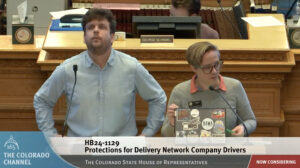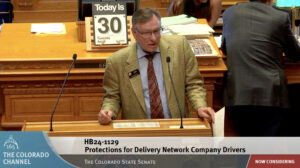Companies from DoorDash to Uber to Lyft that use gig workers to deliver people and goods throughout Colorado largely have reached agreement — even if a somewhat reluctant one — on two bills to add first-of-their-kind regulations to the growing sector.
Legislators are advancing Senate Bill 75 and House Bill 1129 with little resistance in the final days of the 2024 session, increasing the likelihood that both will become law soon. Delivery- and transportation-network companies that originally fought the proposals have worked with sponsors to put a host of amendments onto the measures to limit some of the information that they must turn over to state government and to clarify what they must disclose to passengers and drivers.
Democratic sponsors of the bills and their backers — a mix of drivers-union representatives and workers’ advocacy organizations — say their goals are to let gig workers and their passengers know what they are earning for each trip, versus what companies are keeping. Both bills — SB 75 is aimed at transportation firms like Uber and Lyft, while HB 1129 focuses on delivery firms like Instacart and Door Dash — do this by requiring bill breakdowns for drivers and riders.
But they also say that the proposals seek to ensure that these companies treat drivers as contractors rather than employees by preventing the firms from punishing them or discriminating against them based on their willingness to accept offers. HB 1129 gives all drivers 60 seconds to accept or reject offers, prevents retaliation against them if they take longer to respond and requires companies to inform them of their estimated driving time and earnings before they choose to accept or reject a task.
Dealing with driver deactivations
Finally, both bills also seek to protect drivers from unfair terminations by mandating that companies explaining deactivations to contractors and lay out how drivers can appeal the decision. Workers’ advocates have testified that as many as 15% of drivers have reported deactivations from platforms, sometimes for what they call bogus customer complaints.

A DoorDash driver
SB 75 additionally allows the state to recognize “driver support organizations” that help drivers through their appeals, much like a state-sanctioned union. It allows drivers to be allowed to contribute between 1.5% and 3% of their earnings from each ride to these organizations and requires the TNCs also to help fund their budgets after those budgets are approved by the Colorado Department of Labor & Employment.
The addition of the driver support organizations, which mirror organizations that operate in some other states, is one of the biggest changes that’s been made to SB 75, sponsored by Senate Majority Leader Robert Rodriguez of Denver and Sen. Kevin Priola of Henderson. Earlier, sponsors also cut back the amount of information on tasks and driver deactivations that the bill had proposed companies like Uber and Lyft report to the state after it drove an expected cost of more than $1 million because of the time it would take to process the info.
“While we disagree with many of the requirements, the bill represents a good faith effort from everyone involved to find common ground,” said Harry Hartfield, the lead government-affairs official for Uber in Colorado. “We appreciate Senator Rodriguez’s thoughtful approach to this process.”
More fixes to proposed delivery-network company regulations
Companies like DoorDash and Instacart had even more concerns with HB 1129, as they said its provisions were in many cases impossible to enact. One mandate, for example, would have required customers seeking deliveries be told the breakdown of their payments to drivers and companies, including driver tips, even before drivers decided whether to accept to task and the company knew how much they’d have to pay.

Colorado state Rep. Stephanie Vigil speaks about House Bill 1129 in April while cosponsoring Rep. Javier Mabrey listens.
In House Appropriations Committee, Reps. Stephanie Vigil of Colorado Springs and Javier Mabrey of Denver got rid of DNCs’ disclosure requirements to CDLE and pushed back the deadline for rulemaking, which brought down the cost of implementing HB 1129. Then in the House, they narrowed the language around tips to ensure the driver gets to keep the entire tip and focused the anti-discrimination language to bar companies from retaliatory actions against patients if they take more than one minute to respond to offers.
“What this legislation is about is providing basic protections for drivers — and transparency,” Mabrey said during debate. “I do want to emphasize the extent to which we’ve been working in good faith with those who had opposed this legislation.”
Nothing remains certain about the bill’s futures. While the Senate passed HB 1129 this week on a Democratic-led, party-line vote, the House still must concur with a minor amendment that the upper chamber made to the bill. And SB 75, though it sailed quickly through the House Business, Labor and Technology Committee on Wednesday night, still must get full Senate approval.
Model for regulations by other states?
But with Gov. Jared Polis, a longtime supporter of disruptive business models, having implied that he only would sign the bills if their differences got worked out between backers and critics, the changes seem to make it more likely that the proposals could become law. They won’t overcome objections from Republicans that the regulations are too intrusive — Sen. Mark Baisley, R-Woodland Park, characterized provisions like creating a private right of action in the bill for drivers as “inappropriate” — but they may meet Polis’ bar.

Colorado state Sen. Mark Baisley speaks against House Bill 1129 on the Senate floor in April.
Industry leaders have said they are willing to make the concessions they’ve agreed to in the bills because they don’t know what supporters will bring back next year if the proposals fail in 2024 like they did last year. Observers also have implied that passing a statewide law will head off a localized effort in Denver, where the City Council leans more heavily toward workers and away from employers than the Legislature does.
The bills, if they succeed in getting final approvals before Wednesday’s adjournment of the 2024 legislative session, could set a national precedent.
“I’m really proud of what I think will be model legislation going forward in other states,” Priola said before the Senate passed SB 75 last week on a 26-9 vote that actually drew in three Republicans as supporters.
